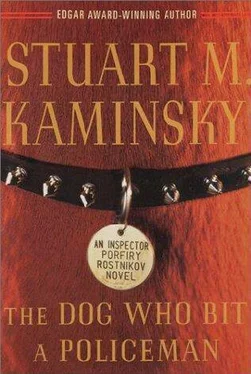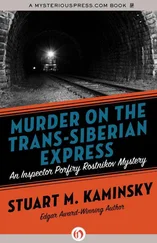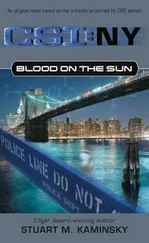Stuart Kaminsky - The Dog Who Bit a Policeman
Здесь есть возможность читать онлайн «Stuart Kaminsky - The Dog Who Bit a Policeman» весь текст электронной книги совершенно бесплатно (целиком полную версию без сокращений). В некоторых случаях можно слушать аудио, скачать через торрент в формате fb2 и присутствует краткое содержание. Жанр: Полицейский детектив, на русском языке. Описание произведения, (предисловие) а так же отзывы посетителей доступны на портале библиотеки ЛибКат.
- Название:The Dog Who Bit a Policeman
- Автор:
- Жанр:
- Год:неизвестен
- ISBN:нет данных
- Рейтинг книги:3 / 5. Голосов: 1
-
Избранное:Добавить в избранное
- Отзывы:
-
Ваша оценка:
- 60
- 1
- 2
- 3
- 4
- 5
The Dog Who Bit a Policeman: краткое содержание, описание и аннотация
Предлагаем к чтению аннотацию, описание, краткое содержание или предисловие (зависит от того, что написал сам автор книги «The Dog Who Bit a Policeman»). Если вы не нашли необходимую информацию о книге — напишите в комментариях, мы постараемся отыскать её.
The Dog Who Bit a Policeman — читать онлайн бесплатно полную книгу (весь текст) целиком
Ниже представлен текст книги, разбитый по страницам. Система сохранения места последней прочитанной страницы, позволяет с удобством читать онлайн бесплатно книгу «The Dog Who Bit a Policeman», без необходимости каждый раз заново искать на чём Вы остановились. Поставьте закладку, и сможете в любой момент перейти на страницу, на которой закончили чтение.
Интервал:
Закладка:
“No money, poets don’t make money,” said the boy. “I want to be a policeman like you. Policemen make lots of money.”
“We do?”
“Bribes, payoffs, everyone knows,” said the boy.
There was enough truth in the statement that Rostnikov ignored the boy’s observation and said, “How close were you when the shooting began?”
“I was right next to the three men who died.”
“You are lucky to be alive,” said Rostnikov.
The boy shrugged and finished off the pastry, licking the residue of sweetness from his fingers.
“I wasn’t afraid,” said the boy.
“Sometimes it is good to be afraid. It makes you careful.”
The boy shrugged again.
“What else did you see?”
“The man in the front seat, the passenger seat. When the car slowed down to kill the three men, both the back and front windows came down. The man in the backseat fired. The old man in the front seat watched.”
“What did these men look like?”
“The shooter wasn’t young. The old man had one of those black things over one eye.”
“A patch?”
“If that’s what you call it.”
Casmir Chenko.
“Why aren’t you in school?” asked Rostnikov.
“I don’t like school. I go sometimes. But I don’t like school.”
“If you want to be a policeman, you have to go to school,” said Rostnikov. “If you go to school, come and see me when you are twenty years old. I’ll probably be retired, but I’ll do what I can for you.”
“Who are you?” the boy asked suspiciously.
“Chief Inspector Porfiry Petrovich Rostnikov of the Office of Special Investigation. Are you impressed?”
“Are you going to want me to sign a statement, point to the old man with the patch in a courtroom, something?” the boy said, not answering the question.
“I don’t think so,” said Rostnikov. “I would like to see you reach the age of twenty so you can become a policeman. Here.”
Rostnikov shifted his weight, pulled out a crumpled card from his wallet, and handed it to the boy. The printing job was crude but it told the story, Rostnikov’s name and title, the name of the Office of Special Investigation, and the phone number and address of Petrovka. “Now go give your name and address to Inspector Karpo.”
“Is he dying?” asked the boy. “The other policeman?”
“No,” said Rostnikov. “His aspect is a combination of heredity, a lack of humor, tragedy, and careful, if unconscious, cultivation.”
The boy understood nothing of the explanation.
Rostnikov had little hope that the boy would become a diligent scholar and appear on his doorstep sometime in the future with the crumpled card in his hand. But if one never tried, one never succeeded. He checked his watch. He was late. He was too late to take the metro and he had no car.
Getting up was a monumental chore, but he managed without slipping. Rostnikov thought he was getting more friendly with his new leg with each day. This was a leg that reminded him of Karpo: solid, emotionless, efficient, and reliable. The withered real leg that was now gone had been more of a Sasha Tkach leg, feeling put upon, emotional, needing help more than helping.
That was an unfair thought. Sasha was a good policeman, a troubled young man but a good policeman.
When the two witnesses were gone. Emil Karpo approached Rostnikov, who was walking out of the market past the stalls.
“I will meet you back at Petrovka,” said Rostnikov. “I want Casmir Chenko in my office in two hours. You know how to find him.
If he is in hiding, locate him. Get whatever help you need from Opatchoy in MVD Uniform Division. He owes me a favor. Be careful. Take whatever men you need.”
“He will be in your office,” Karpo said.
Back on the street, with the sun making a futile effort to come out from behind very black clouds, Rostnikov took one last look at the corpses and moved down the street in search of a cab. In less than a block, he had found one, even though they were not very close to the tourist hotels. Cabs were plentiful in Moscow.
This one sported a dour driver with the weatherworn, pinkish face of an alcoholic, a face very familiar in Moscow.
Rostnikov climbed in awkwardly, closed the door, and told the driver where he wanted to go. “I am a police inspector,” Rostnikov said as the man shifted into second. “You will charge a fair amount or I will declare this vehicle commandeered for police business, in which case you will be paid nothing. You understand?”
The driver nodded.
“Are you married?” asked Rostnikov.
The driver nodded.
“Children?”
“Two,” said the driver in the most gravelly voice Rostnikov had ever heard. It was even more rough than that of his sergeant when Rostnikov was a boy soldier.
The driver waited for more questions. None came.
Fifteen minutes later the cab pulled up in front of the hospital.
“What do I owe?” asked Rostnikov.
“Whatever you want to pay,” said the driver.
“I want to pay nothing,” said Rostnikov. “But you deserve payment for your work.” Rostnikov gave the man more than the trip would normally cost.
“Thanks,” said the driver.
“May your family be healthy,” said Rostnikov.
“May my family stop complaining,” said the driver.
Rostnikov got out of the cab and began the short walk to the door of the small hospital. Sarah’s surgery was one hour away.
Chapter Thirteen
Iosef stood before the desk of Director Yaklovev, doing his best to hide his anger. It took all of the skills he had learned in the theater. He should have discussed this with his father before he came to see the director, but he was fairly certain what Porfiry Petrovich would have advised.
Iosef didn’t want common sense and he didn’t want caution. He wanted to express his ire even if it cost him his job. Since he preferred not to lose his job and he hoped for some satisfaction, Iosef decided to play the role of an unflappable diplomat, unsurprised by events, only slightly disappointed by the actions of his superior.
It was what he decided, but Iosef was certain that his indignation would overcome him. There really was nothing to gain here and much to lose.
Yaklovev sat behind his desk, looking at the transcript of the confession of Oleg Kisolev and the statements of Yulia Yalutshkin and Yevgeny Pleshkov. It was Iosef ’s copy, the copy Pankov had handed to the young inspector less than fifteen minutes earlier.
“Yes, I have heard the tape,” said the Yak. “I have read the transcript.”
“And?” asked Iosef.
“Too many typing errors, but I will edit them and Pankov will produce another version,” said the Yak.
“This,” said Iosef, pointing at the transcription, “is not what happened. Oleg Kisolev has no money. The German wouldn’t get anything by trying to blackmail him. And how would he know that Kisolev was homosexual? If Oleg told Yulia to take Pleshkov away from the hotel after he killed the German, there is no chance she would do it. She would never be ordered about by Oleg Kisolev or anyone else. You saw that. And Kisolev is incapable of participating in such a sequence of events-killing the German, trying to destroy the body, ordering Pleshkov to leave the scene. In this version, Pleshkov and the woman did nothing, and Kisolev acted in self-defense and to protect his friend. And none of this is what they told me and Zelach. It is a different story.”
“Are you finished?” asked the Yak calmly.
“I don’t know,” Iosef said.
“You are finished,” said the Yak. “And if you pursue this case any further, your career will be finished before it begins. You are a very good investigator. You could be, with time, as good as your father, possibly a chief inspector. I have great respect for Porfiry Petrovich’s discretion and ability. He could not be pleased if I were forced to dismiss you from Special Investigation. Pause now and think. Think and discuss this with your father.”
Читать дальшеИнтервал:
Закладка:
Похожие книги на «The Dog Who Bit a Policeman»
Представляем Вашему вниманию похожие книги на «The Dog Who Bit a Policeman» списком для выбора. Мы отобрали схожую по названию и смыслу литературу в надежде предоставить читателям больше вариантов отыскать новые, интересные, ещё непрочитанные произведения.
Обсуждение, отзывы о книге «The Dog Who Bit a Policeman» и просто собственные мнения читателей. Оставьте ваши комментарии, напишите, что Вы думаете о произведении, его смысле или главных героях. Укажите что конкретно понравилось, а что нет, и почему Вы так считаете.












